Film Reviews: 2023 Oscar Nominated Short Films — Animation and Live Action
By Betsy Sherman
2023 Oscar Nominated Short Films: Animation and 2023 Oscar Nominated Short Films: Live Action – Opening at the Coolidge Corner Theatre, Brookline, and the Kendall Square Cinema, Cambridge, on February 17, at the Somerville Theatre on February 24.
My Year of Dicks can be seen on Hulu, and for a limited time on the film’s website.
The shorts categories of the Academy Awards aren’t just filler for your scorecard anymore. The nominees in the animated, live-action (fiction), and documentary short categories have become successful pre-Oscar programming in movie theaters (presented as separate screenings). And why not? Short films, like short stories, have a special ability to move and/or amuse, and to deliver quick ironic twists or epiphanies.
The five nominees each in the animated and live-action categories (documentaries will get a separate review) will give audiences a glimpse back in time, and a tour around the world — partly because, ahem, there’s only one US production out of the 10 shorts.
From allegory to metaphysical exploration to simply meta, or alternatively, displaying trenchant realism, the nominees for this year’s ceremony on March 12 are strong (I only have reservations about one of them).
ANIMATED SHORTS (Running Time: 95 min.)
First, a note about the animated program: the first four films are suitable for children 10 and older, but the fifth, My Year of Dicks, is for adult audiences. There will be an onscreen announcement to that effect and a short break for patrons to leave if they wish.
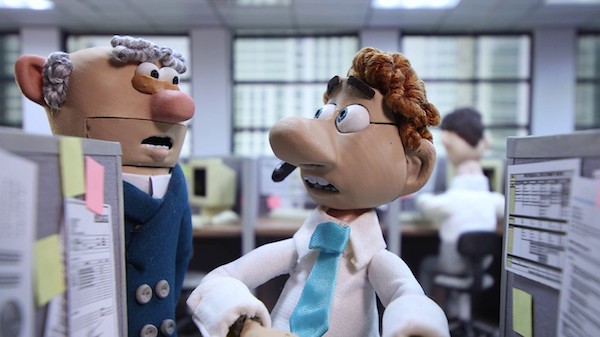
A scene from An Ostrich Told Me the World Is Fake and I Think I Believe It
To start with some laughs and an existential chill down the spine, the Australian An Ostrich Told Me the World Is Fake and I Think I Believe It is comical kin to the TV series Severance. The media apparatus of a stop-motion animation studio is shown, with the animated world framed within a monitor. That world is a soul-draining telemarketing operation, in which protagonist Neil is a flop at selling toasters. A few moments of tension with the boss reveal a rift in the matrix. Neil sees that body parts become suddenly interchanged, and the edges of the office lead nowhere. Even the ostrich that materializes and, in plummy, professorial tones, schools Neil on the artifice of everything can’t assuage his panic. In the tradition of Chuck Jones’s Duck Amuck, Ostrich allows its maker, Lachlan Pendragon (who toiled as a telemarketer himself) to slyly give the animator godlike stature.
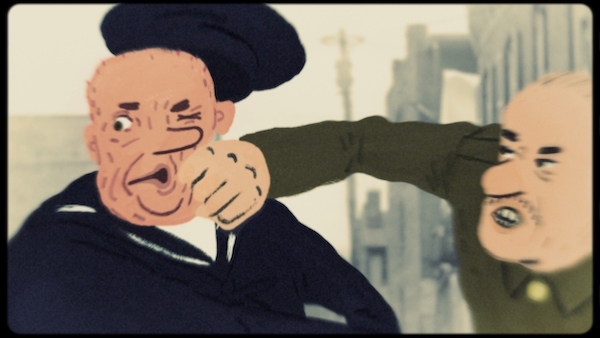
A scene from The Flying Sailor.
Canada’s The Flying Sailor, by Amanda Forbis and Wendy Tilby, is an eight-minute tour de force. With no dialogue, and potent use of sound and music, it fancifully depicts a 1917 incident at Halifax Harbour in which the force of an explosion on a ship carrying TNT sent a sailor in the air; he landed two kilometers away, alive. A hybrid aesthetic is used here, with the barrel-chested, stubbly-haired tar depicted in a flat, simplified style, whereas the dimensions he travels through — in time, as his life flashes before him, and space, as he escapes the bounds of Earth — include impressionistic live-action backdrops. His clothes torn off by force, he becomes a big burly baby, tumbling in the cosmos with a cigarette in its mouth. Awesome in every way.
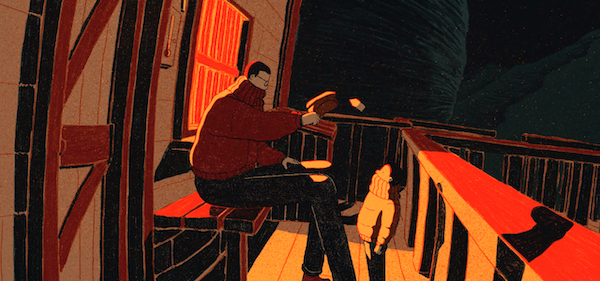
A scene from Ice Merchants.
There’s flying going on as well in the Portuguese Ice Merchants by João Gonzalez. The film is achingly elegant in its design of character, architecture, and landscape. The artwork draws on a limited color palette, and emphasizes perspective. The messages it carries are overt and oblique. There’s no dialogue here, and the music was written by Gonzalez. A father and young son live a seemingly happy existence in — uh-oh — a house that’s suspended from the side of a mountain. They produce and sell ice, diving through the air to take their wares to the village below. As we watch their daily routine, we glean the trust between the father and son, and their faith in the natural world — that it will keep them safe and their commerce viable. But the thermometer is inching up above the freezing point, promising disaster, not only for the business. That’s the overt message, about climate change. But there’s also a sense of personal grieving, of something missing. That something is a someone whose spirit makes things all right, for now. The film leaves us with a sense of precariousness mixed with sweetness.
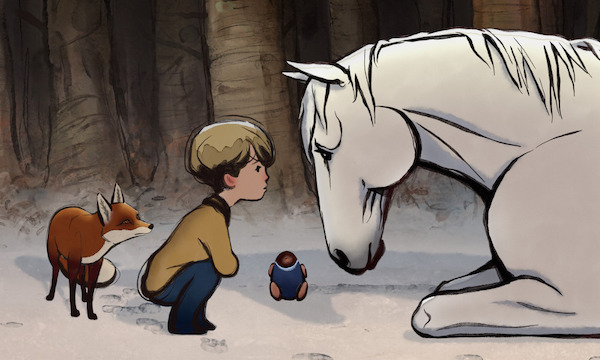
A scene from The Boy, the Mole, the Fox, and the Horse.
The British The Boy, the Mole, the Fox, and the Horse by Charlie Mackesy and Peter Baynton is visually gorgeous, making use of a watercolor style, with wonderful hand-drawn character animation. Too bad, then, that the story comes off like a 33-minute public service announcement for a mental health hotline. It’s based on Mackesy’s book of the same name; I hadn’t heard of it before but I gather it’s acclaimed and beloved. So maybe I don’t have to explain its premise much: a boy is lost in a snowy rural area, and he makes animal friends who try to keep his spirits up while helping him find his way “home” (a deliberately nebulous word here). It starts out somewhat engagingly (with a strong Winnie the Pooh vibe), as the boy converses with a chatty mole who’s obsessed with cake. However, the animal’s aphorisms slide ever closer to gooey affirmations. By the time the title’s roster of characters fills out, everyone is talking about their vulnerabilities and consoling the boy to the point of suffocation. Boy: “What’s the bravest thing you ever said?” Horse: “Help” (help!). There’s an impressive voice cast, with Tom Hollander as The Mole, Idris Elba as The Fox, and Gabriel Byrne as The Horse. But I’d sacrifice them; better to watch this one with the sound turned off.
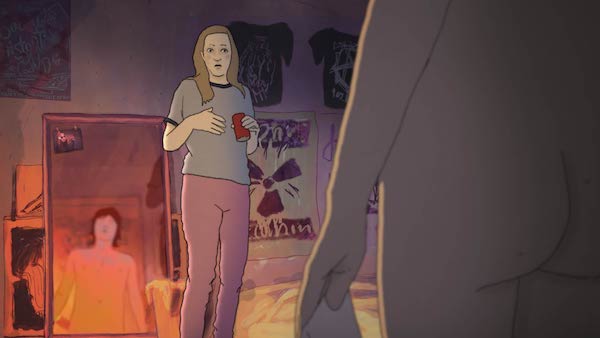
A scene from My Year of Dicks.
There are no penises in the fabulous My Year of Dicks (you can’t say that about the flying sailor, with his flying danglies). It is the only American animated short to be nominated and its subject is sex — to be specific, the quest of a 15-year-old girl in the Houston suburbs to find an acceptable boy and lose her virginity. Iceland-born animator Sara Gunnarsdóttir and Pamela Ribon switch up animation styles in this episodic adaptation of Ribon’s 2014 comedic memoir Notes to Boys: And Other Things I Shouldn’t Share in Public. It’s a bighearted and wry look at the youthful illusions that live inside a pubescent female body. The story is also about the risks and rewards of deciding to say yes (up to a point). The realistic character work (based on actors’ movements and expressions) grounds the animator’s aesthetic flights of imagination (Gunnarsdóttir did the animation in The Diary of a Teenage Girl). I don’t want to give away what happens in the stories, so … let’s envision how much fun the makers of a movie with this title could have accepting one of those phallic gold-plated statuettes.
LIVE ACTION SHORTS (Running Time: 110 minutes)
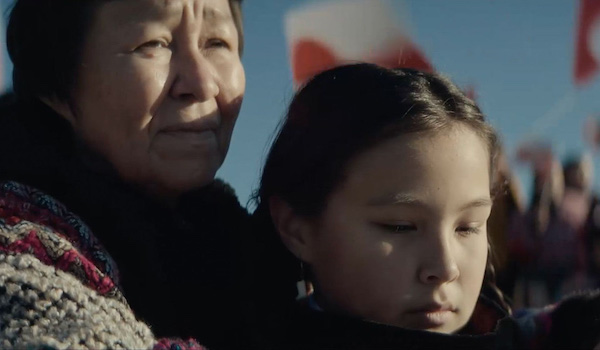
A scene from Ivalu.
Denmark’s Ivalu, directed by Anders Walter, is set in that kingdom’s country of Greenland, with dialogue in the Greenlandic language. It’s based on the graphic novel of the same name by Morten Dürr and Lars Horneman. A dynamic and moving look at life within a family on the sea coast, Ivalu deals with power, transgression, and loss. It asks whether a cycle of horrifying abuse can be broken. We hear the anguished thoughts of schoolgirl Pipaluk (Mila Heilmann Kreutzmann), whose beloved older sister Ivalu (Nivi Larsen) is missing. In flashback we see the paradox of how beauty, symbolized by a vibrantly red ceremonial costume, can serve as an invitation for exploitation (this could apply in the colonial context as well). The point of view shifts between Pipaluk on her search and a raven that’s helping her. Ivalu used to tell her sister “the old myths” and, in an act of courage, she may have invoked one of them in order to protect the younger girl.
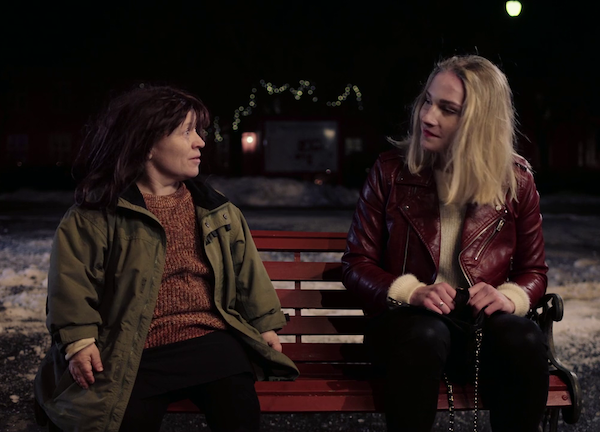
A scene from Night Ride.
There’s a piercing look at human relations in the Norwegian Night Ride, directed by Eirik Tveiten. On a winter’s night, Ebba (Sigrid Kandal Husjord), a little person, goes from would-be tram passenger to the unexpected lone driver of that tram. By trial and error, she gets the hang of the levers and buttons. When she stops to pick up passengers, it seems that a comic romp is in the offing. But something darker and deeper happens when an encounter escalates into bullying, and Ebba moves off the driver’s seat to try to intervene, even though it makes her a target as well. The film dramatizes how our attitudes to ourselves and others can entrap us. The message: we can’t get away with merely looking in the rearview mirror.
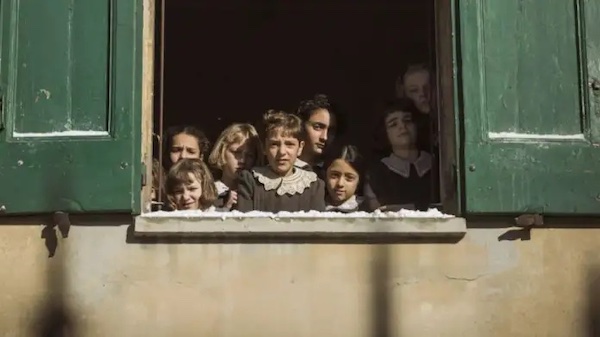
A scene from The Pupils.
Italian director Alice Rohrwacher is an accomplished maker of features that have a touch of magic about them (The Wonders, Happy as Lazzaro). In the multilayered period piece Le Pupille/The Pupils, she recreates an austere Italian Catholic orphanage for girls during World War II. A setting of deprivation and misery inspires this perfect delight of a film. What faces on these vivacious little girls! The director’s sister, Alba Rohrwacher, plays the flinty Mother Superior, her habit forming a black brick wall between the girls and any source of pleasure. Still, there’s a good deal of mischief going on behind the nuns’ backs. Yet it’s the one girl who tries so hard to be good, Serafina (Melissa Falasconi), who turns out to be a handful this particular Christmas. There’s an annual holiday transaction that calls for the townspeople to give what they can in exchange for the angel-costumed orphans to pray for a loved one. A fur-coated rich lady and her gaudy, delicious-looking gift upsets the equilibrium of this religious institution. Combine its sensuality with a pop song you can’t help dancing to, and can the fires of Hades be far off?
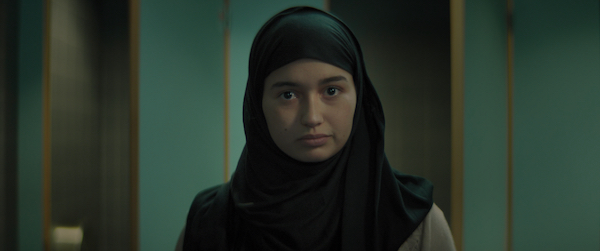
A scene from The Red Suitcase.
Cyrus Neshvad’s The Red Suitcase is a particularly resonant nominee. In a Luxembourg airport, a 16-year-old Iranian girl, Ariane (Nawelle Ewad), has arrived to be married to a much older man she doesn’t know. Terrified, she hangs back from entering the public area, where he waits for her. In the ladies’ room, she makes the potent gesture of removing her hijab and fluffing her hair. She manages to walk by him unnoticed, but it’s a short-lived reprieve. She’s in a strange place and doesn’t speak Western languages. The eponymous piece of luggage holds the fruits of her creative efforts. In a sense, it is her identity. She cannot go down the path of this arranged marriage, but that decision may exact a painful price: her past and the identity she’s known. It’s an affecting story, well dramatized.
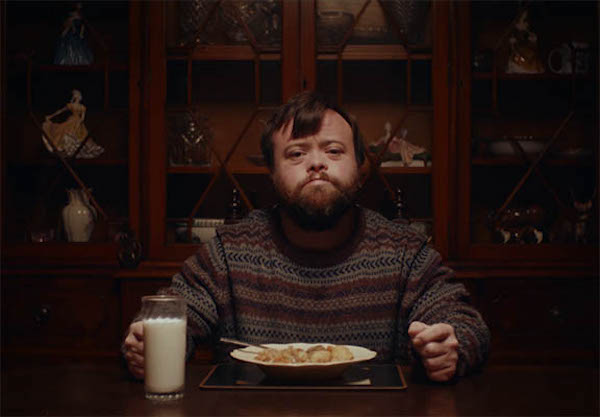
A scene from An Irish Goodbye.
The subset of movies about handling a loved one’s ashes according to their wishes (sometimes this propels a whole plot, and in Mel Brooks’ Life Stinks it makes for a great gag) is now joined by the feisty Northern Ireland production An Irish Goodbye, directed by Tom Berkeley and Ross White. Turlough (Seamus O’Hara), who has emigrated to England, returns to Northern Ireland upon the death of his mother. A local priest accompanies him and his brother Lorcan (James Martin, an actor with Down’s Syndrome), to the family farm. Lorcan loudly and profanely asserts he won’t be relocated to an aunt’s house, as is Turlough’s plan. To stretch out his brother’s visit, Lorcan insists they accomplish the items on Mum’s bucket list. Since she’s no longer alive, they’ll bring the urn with Mum’s ashes along. There’s inspired absurdity and much back-handed humor and, as the bickering calms into fraternal bonding, you might even get a bit misty.
Betsy Sherman has written about movies, old and new, for the Boston Globe, Boston Phoenix, and Improper Bostonian, among others. She holds a degree in archives management from Simmons Graduate School of Library and Information Science. When she grows up, she wants to be Barbara Stanwyck.
Tagged: 2023 Oscar Nominated Short Films: Animation, 2023 Oscar Nominated Short Films: Live Action, An Irish Goodbye, An Ostrich Told Me the World is Fake and I Think I Believe It, Ice Merchants, Ivalu, Le Pupille/The Pupils, My Year of Dicks, Night Ride, The Boy the Mole the Fox and the Horse, The Flying Sailor
